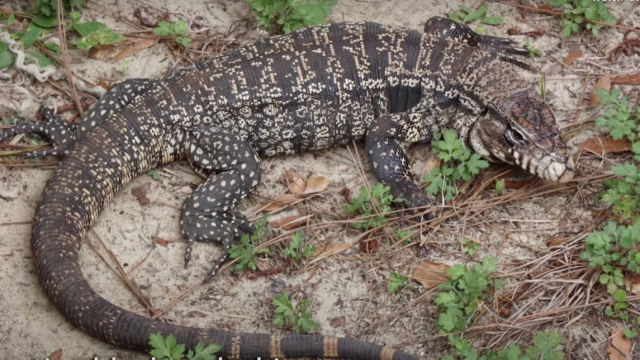Massive Salmonella-Spreading Lizards Are Multiplying in the U.S.
Invasive species pose a serious threat to our native ecosystems, typically because they don’t have any natural predators and are therefore able to outcompete native plants and animals. But certain invasive species can also impact humans and public safety, including the Argentine black and white tegu, which has been spotted in the Southeastern portion of the U.S. According to the Georgia Department of National Resources (DNR) Wildlife Resources Division, these South American lizards can carry and spread Salmonella—and recent reports suggest they may be multiplying.
RELATED: 15-Foot Invasive Pythons Are Moving North From Florida and Can’t Be Stopped.
Wildlife agencies in South Carolina are asking people to report sightings of this variety of tegu, which can grow up to four feet long and weigh roughly 10 pounds. This month, representatives from the South Carolina Department of National Resources (SCDNR) told FOX Carolina that since they first confirmed tegus in the state, they’ve received 100 reports of tegu sitings. Of those reports, the agency confirmed 24 sightings of black and white tegus and two sightings of invasive red tegus.
According to the SCDNR website, the first sighting dates back to Aug. 2020. A few months before, the agency had informed the public that the tegu—a popular pet—was also spotted in the wild in both Georgia and Florida, “likely as a result of release or escape.”
“The introduction of any non-native species can have serious negative impacts on native wildlife. Black and white tegus are no exception,” SCDNR herpetologist Andrew Grosse said in the 2020 release. “Tegus mature and reproduce quickly, though most concerning may be their preference for eggs and the potential impacts to our native ground-nesting birds like turkey and quail, as well as other species such as the state-endangered gopher tortoise.”
In addition to threatening endangered species, there’s also the concern for public health. Like other reptiles, research shows tegus carry Salmonella, per the Georgia DNR. As such, there are concerns that they could “spread exotic parasites to native wildlife and cause bacterial contamination of crops.”
According to a 2017 study of Salmonella in tegu lizards, human infection with Salmonella typically comes from eating animal products, but it can also occur when you keep reptiles as pets or via contaminated soil or water.
RELATED: Officials Issue Rare Winter Rattlesnake Warning—How to Stay Safe.
In May 2021, the SCDNR banned the non-native Argentine black and white tegus from being brought into South Carolina or reproduced. Those who do choose to own them as pets are required to register the reptiles with SCDNR. Florida and Alabama were enacting similar bans, per the SCDNR press release.
The agency added that regulations were intended to curb “the proliferation of tegus before they are able to establish and do real damage in our state.” However, they’re still present in the wild—and making matters worse, research suggests that tegus can hibernate when it gets cold, increasing survival chances and allowing them to spread to other parts of the Southeastern U.S., per the Georgia DNR.
Wildlife agencies in Georgia, South Carolina, Florida, and other states ask that you report sightings of these tegus online. To officially confirm a sighting, a photo of the lizard is generally required.
You can recognize the invasive lizard by its “mottled black and white coloration” that appears in a banding pattern, according to the FWC. Hatchlings have a similar pattern, but you can distinguish them by their bright green heads.
RELATED: For more up-to-date information, sign up for our daily newsletter.
- Source: First sighting of black and white tegu lizard confirmed in Midlands
- Source: Salmonella enterica in Invasive Lizard from Fernando de Noronha Archipelago: Serotyping, Antimicrobial Resistance and Molecular Epidemiology
- Source: New regulations will ban tegus, require current owners to register reptiles
